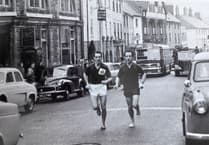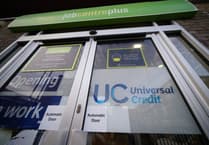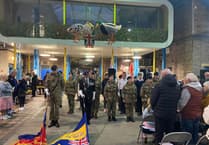SOME men inspire through actions. Others flatter to deceive with the finery of words. While a rare few are inspirational simply through the simple act of staying alive and persevering against immense odds.
Abergavenny man Paul Silcox falls into the later camp. He has survived a kidney transplant, lymphoma, four bouts of sepsis, and is currently undergoing chemotherapy to help control the prostrate cancer he was diagnosed with last September.
It’s something of a raw deal, but as Paul explained, “Since I had my kidney transplant 40 years age, I’ve counted every day as a blessing. I’m one of the lucky ones to have survived this long with a donated kidney.”
In 1975 at the age of 21 Paul was diagnosed with kidney disease. The following February a portakabin was set up in the garden of his parent’s home in Park Crescent to house a kidney machine, which Paul had to hook himself into three times a week for six-hour sessions.
Life had been severely disrupted for Paul by this point, who as a qualified toolmaker had been unable to work regularly during the last two years because of his condition."
However on March 22, 1977, Paul received an unexpected telephone call at 1.30pm
from the Cardiff Royal Infirmary informing Paul of the offer of a transplant.
In the company of of his parents, Paul was rushed by police car to the hospital.
The operation took place at 6.30pm of that day.
Paul said, “I remember lying in bed when a guy who previously had a kidney transplant told me to not look so worried, I’d soon be on my feet. He said he’d had his operation 11 years ago. I remember thinking with a big smile on my face, ’11 years! I’d be over the moon if I got two years of being able to live a normal life.’”
Four decades on, life has been anything but normal for Paul.
In the aftermath of the operation, Paul went from struggling to climb the stairs to successfully taking on the world in olympic running
Paul said, "It was like being given a new lease of life. As soon as I returned home from the hospital I noticed the difference. I could walk up the stairs in one go, whereas as before I had to stop and catch my breath.
"To put into words the transformation I felt to someone who has not been through a similar situation is almost impossible. The best way to describe it is where as before I was just existing, I now felt that after a long, long time I was finally starting to live."
A few months after returning home, Paul bought a tracksuit and started some simple jogging and weight training to build upon and celebrate his newly discovered fitness, with the help of his coach and uncle Ray Hardee.
18 months later Paul received a call from a surgeon at Cardiff Royal inquiring if Paul would be interested in being one of their team of eight to compete in the first ever ’Transplant Olympics’ taking place in Portsmouth.
Paul said, "I jumped at the chance to participate in the event at Portsmouth, not only because of the personal motivation of setting myself a goal and pushing my fitness levels to another level, but also because by competing I would be positively reminding people of the true value of donating a kidney."
Paul personally excelled at the event to bring home a silver medal in the 100 metres, but his greatest and most euphoric triumph came in the dramatic 3 x 50 metres relay, when he stormed from fourth to first in the last stage to secure a gold and overall third place for the Cardiff Royal Infirmary team.
Following the Games, Paul joined Torfaen running club where he trained alongside a young Colin Jackson.
Paul recalled his running coach telephoning him one day with news of an athletics meet that was being held that night at Torfaen stadium with clubs from Swansea, Newport, and Cardiff all competing.
Paul said, "The coach had entered me in the 100 metres event without my knowledge and he basically told me, if you don’t run in this event then your time with this club is over."
Paul overcome his nerves, and not only competed but came eleventh in an event that included 40 other sprinters.
"That for me was the turning point," added Paul, "The confidence that competing outside of a Transplant Games event on such an equal footing gave me was inspiring, and from that moment on the momentum just kept on building."
In a symbolic gesture Paul turned the portakabin that had housed his kidney machine into a gym, trained even harder, and in the years to come Paul enjoyed a career in athletics that took him as far afield as New York, Athens, Amsterdam, and Budapest, to represent Great Britain in the World Transplant Games.
During his time on the track, Paul has won 40 medals, and over half of them are gold. He is also renowned for the distinction of being the only man in the world to win a medal in every Transplant games event for an amazing 15 years in succession.
Paul has never forgotten or taken for granted the importance of organ donation and how even through death, life can be give anew thanks to the humanity and kindness of others.
Five years ago Paul discovered for the first time that his personal donor was a 12-year-old boy who had been knocked off his bicycle by a car and killed.
“His parents gave the hospital permission to take his kidney and I was called in,” revealed Paul in sombre reflection.
“When I heard this I was absolutely shell-shocked. All this time I had believed I was carrying the kidney of a victim from an airplane crash, when it fact it had belonged to a young boy with his whole life ahead of him and two loving parents.”
In tribute to the youngster, Paul penned a song with his wife and musician Christopher Llangworthy called ‘The Gift of Life,’ accompanied by the Brecon Male Voice Choir.
Yet just as the song which was to raise funds for Kidney Research UK was about to be recorded, disaster struck and the father-of-three was diagnosed with lymphoma.
Paul explained, “I had been feeling desperately ill for quite a time. I was struggling with pneumonia and had lost two and a half stone. Initially the doctors told me I had lung cancer, and as you can imagine upon hearing that everything went dark and my world just seemed to screech to a grinding halt.”
Upon further consultations and scans, the initial diagnosis was proved wrong and Paul was told that he didn’t have lung cancer but lymphoma.
“Although I was very relieved not to have lung cancer, I was still very worried,” said Paul. “Especially as I was told that I had to stop taking the immune suppressors which I had been taking since my transplant, because these drugs were preventing my body from fighting off the tumours.
“The doctor pretty much told me, ‘You kidney is secondary. These tumours will kill you very quickly if we do not act now.’”
Paul stopped taking the medication which had been part and parcel of his daily life for the last 35 years and the biggest shock was, not only did his health start to improve, but that he actually began to feel better than he had in years.
“It was a very rough road to recovery at first,” revealed Paul. “The lymphoma was very aggressive and I was quite literally on my back for a long time. I had to sleep sitting up for months, which was very unpleasant, but bit by bit and slowly but surely I felt I had been given yet another new lease of life.”
In the wake of his battle with lymphoma, Paul Silcox performed at the Royal Albert Hall alongside Brian May, Alice Cooper, and Iron Maiden signer Bruce Dickinson as part of a Channel Four documentary about the Big C Choir - a 32 strong group of people who had all been diagnosed with cancer.
Described by doctor as something of a medical miracle Paul continued to do what he does best, and that is to keep on keeping on.
Yet late last year the 63-year-old’s world was turned upside down again when he received the devastating news that he had prostrate cancer. And this time the doctors said it was terminal.
Paul explained, “The chemotherapy will hopefully contain it but it won’t cure it. I refuse to feel sorry for myself though. You’ve go to deal with what’s in front of you and there’s no point dwelling on the past.”
Although Paul admits the chemotherapy sessions are exhausting and he’ll be glad when they’re over, he has nothing but praise for the staff at Nevill Hall Hospital and Velindre Cancer Centre.
Forty years on from the operation that saved his life, Paul is still here and still battling. Still fighting and still never taking his health for granted.
Paul revealed, “When I was active in athletics, it was instilled in me to never give in and never to quit. As a runner I look at things like a marathon. The going is tough, the way is hard, but I’m a survivor and I’ll keep on going no matter what obstacles are thrown in my path.”





This article has no comments yet. Be the first to leave a comment.